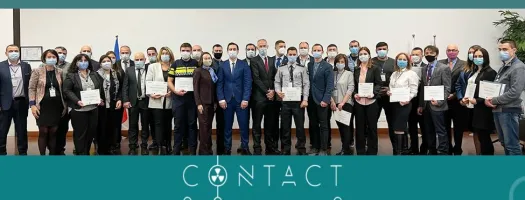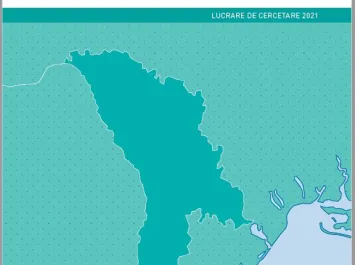On 6-10 December, the United Nations Interregional Crime and Justice Research Institute (UNICRI) held a five-day regional train-the-trainers (TTT) session on preventing radiological and nuclear (RN) trafficking in the Georgian capital, Tbilisi.
The session is the fourth of a series of training events organized within the project's scope “CONTACT – Black Sea – Enhancing capacities to prevent the trafficking of radiological and nuclear material in the Black Sea region.” Specifically designed for nuclear security practitioners, the capacity-building training focused on sharpening participants' skills in sharing their expert knowledge with their peers. The event was organized with the support of the Chemical, Biological, Radiological, and Nuclear (CBRN) National Focal Points (NFPs) of Moldova, Georgia, and Ukraine.
Overall, 22 practitioners from different governmental agencies of these countries took part in the event. The participants, who had attended previous national TTT events, reviewed their subject-matter knowledge, hold practical exercises on inter-agency and international cooperation, and practiced lecture delivery skills. They also had a chance to work with their country teams and start designing their 2022 national training.
The event was facilitated by four UNICRI trainers who provided theoretical information and assigned practical exercises using multiple innovative training approaches. In addition to discussing subject-matter knowledge and engage in practical exercises, trainees practiced the role of trainers by applying the instructors' teachings. During the five days, the 22 practitioners had also the opportunity to interact and share experiences with colleagues from different agencies and partner countries.
The training was attended by Mr. Giorgi Sabedashvili, Director of the Information-Analytical Department of the State Security Service of Georgia; LTC Bernhard J. Dobner, Chief of Defense Threat Reduction Agency (DTRA) – Eurasia; and MAJ Margo Shields, Deputy Chief of DTRA-Eurasia.
“We are very glad today because we have finalized this training session on nuclear security in the region. We think that regional cooperation is very important to Georgia, Ukraine and Moldova as we are sharing a lot of common experiences, and we think that this cooperation should continue in the future,” said Mr. Sabedashvili in his closing remarks.
”We have a shared interest in developing a common understanding and in exchanging good practices to deter and disrupt incidents related to trafficking of radiological and nuclear material. Through the project CONTACT, implemented by UNICRI, experts and specialists come together to not only share information and to develop a better understanding of the threats involved, but also to conduct very useful practical exercises. We also think that the project CONTACT will serve as a model in the region for other comparable trainings,” said LTC Dobner.
“CONTACT-Black Sea is a very important project for Georgia because it focuses on RN trafficking in our region. Due to the geographical position of Georgia, our country had experienced several RN trafficking cases in the last few years. This is why we need to expand our experience, and the representatives of our agencies need to have a broader perspective and share knowledge with their Moldovan and Ukrainian colleagues,” said Ms. Diana Tsutskiridze, National CBRN Focal Point of Georgia.
“The project is of particular importance for the Republic of Moldova. It focuses on building the capacities of our national institutions in this very important domain – combatting the trafficking of radiological and nuclear material. Seven national agencies have benefited from the training activities and will support the implementation of the project at the national level. The project will not end with this phase and will continue by building the capacities further on. We appreciate the possibility of cooperating with our Georgian and Ukrainian partners in this important field,” said Ms. Vera Tarsina, National CBRN Focal Point of the Republic of Moldova.
“What is particular about the project CONTACT-Black Sea is that it is aimed at our region, which is of high priority to Ukraine. We have a number of risks of potential smuggling of RN material, and we should be ready to respond and coordinate our activities. We really appreciate the assistance of the donors of this project,” said Mr. Maksym Samusevych, National CBRN Focal Point of Ukraine.
On the 1st of June 2020, UNICRI officially launched the project “CONTACT Black Sea: Enhancing capacities to prevent the trafficking of radiological and nuclear material in the Black Sea region”. The CONTACT - Black Sea project aims to enhance the capacities of security and law enforcement officials in Georgia, Moldova and Ukraine to prevent and counter trafficking of radiological and nuclear material and foster regional cooperation and exchange of information on RN trafficking-related incidents. The project is implemented by the UNICRI and jointly funded by the United Kingdom Department for Business, Energy & Industrial Strategy (UK BEIS); the Norwegian Radiation and Nuclear Safety Authority (DSA); and the US Defence Threat Reduction Agency (DTRA). The regional TTT session will be followed by three national trainings, one in every participating country, to be held in 2022 with the support of UNICRI.



